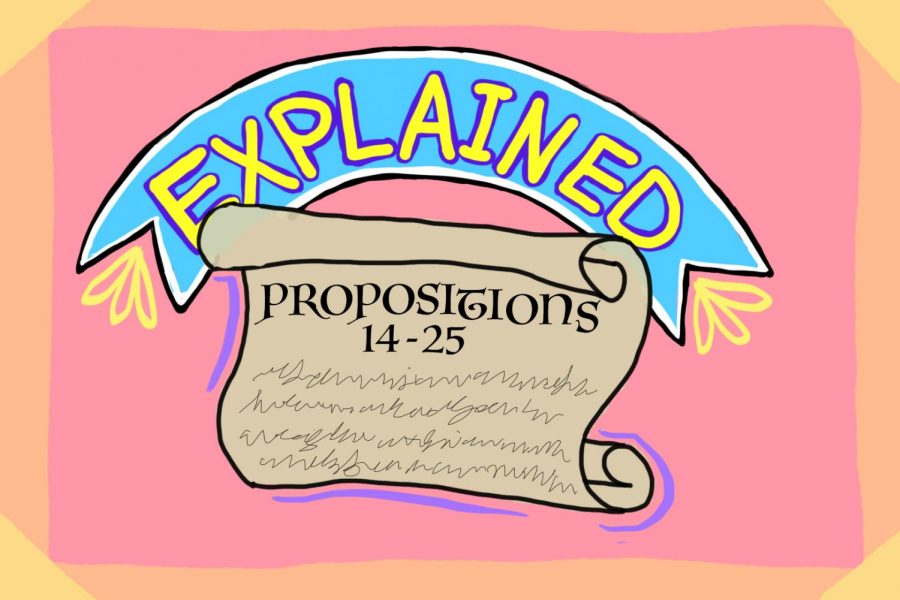California 2020 Propositions, Explained
There’s more than a president to vote for this November
Illustration by Louisa Guo/SAC.Media.
The presidential election is four weeks away, but there’s more than a presidential vote here in California. If you’re overwhelmed with all the measures appearing on the November ballot this year, don’t worry. Here are the 12 upcoming propositions, explained.
Prop 14 – $5.5 Billion Bond for Stem Cell Research
This amendment would issue a $5.5 billion bond, money borrowed from investors and repaid by taxpayers, with interest, to the California Institute of Regenerative Medicine, whose funding is running out from an original measure from 2004.
Proponents argue that the 2004 measure has led to dozens of clinical trials and thousands of scientific articles about stem cell research and that further funding will allow scientists to expand research on diseases that affect many Californians, like Alzheimer’s, Parkinson’s and epilepsy.
Opponents argue the purpose of the original 2004 measure was because there were federal restrictions against stem cell research that no longer exist and no life-saving cures and therapies have been discovered since its inception in 2004.
Prop 15 – Commercial Property Tax
This amendment would value commercial property taxes at its current value. This would also reverse protections under the 1978 proposition 13, which taxed properties based on their original purchase price, but would still allow homeowners, small businesses and agricultural land precedent under the 1978 law.
Proponents argue that local governments have seen revenue from property taxes plummet since 1978, and that taxing the bigger corporations, worth more than $3 million, will contribute to funding local schools and counties.
Opponents argue that proposition 15 would burden commercial property renters, who would pass along the costs to their tenants, and farm fixtures, like barns, dairies and fruit trees, which are not exempt.
Prop 16 – Make Affirmative Action Legal Again
This amendment would restore affirmative action in California. Affirmative action would allow the consideration of race, sex, color, ethnicity or national origin in public employment, education and contracting. State legislators voted to put this measure on the ballot after reckoning with the nationwide George Floyd protests.
Proponents argue that the amendment will combat generations of systemic racism and that ever since California banned affirmative action in 1998, diversity has decreased in public institutions.
Opponents say that it is discriminatory to have preferences for candidates based on race or ethnicity and that the state already makes an effort to help students who grew up in low-income families.
Prop 17 – Give Parolees the Right To Vote
This amendment would allow those out on parole to regain their right to vote and would allow parolees to run for office if they have not been convicted of perjury or bribery. This would amount to around 40,000 Californians. At least 15 other states and the District of Columbia have a similar law.
Proponents say that parole is meant for individuals to transition back into society after prison and restoring their right to vote is a way for them to be civilly engaged.
Opponents say that parolees have not finished serving their sentence and therefore should not have the privilege of restoring their voting right.
Prop 18 – Give 17-Year-Olds the Right to Vote
This amendment would change the voting law to age 17 if the person will turn 18 by the time of the next general election. This would allow them to contribute in the primary and special elections. At least 19 other states and the District of Columbia have a similar law.
Proponents argue that many 17-year-olds already work and pay taxes, and that this would jumpstart their participation in the democratic process.
Opponents argue that 17-year-olds should not be allowed to vote before they are legal adults as they are heavily influenced by teachers, their brains are not fully developed and they do not have the same reasoning abilities as adults.
Prop 19 – Property Tax Break for Older People
This amendment has two parts: first, it would allow older people to purchase homes while retaining the property tax on their original home, based on the 1978 tax law. Second, it would allow children who inherit their parent’s property to retain the original property tax only if the home is their primary residence.
Proponents argue that incentivizing older people to move will free up the housing market and closing the loophole that allowed people with inherited property to profit via renting will collect taxes for firefighters.
Opponents argue that it is a twisted policy law to grant larger commissions to realtors and giving tax breaks to one group of people is the wrong way to approach property tax reform and allocating revenue to firefighters hampers a government’s ability to direct funding where needed.
Prop 20 – Harsher Penalties for Petty Crime
This amendment would give the ability to reclassify property crimes as felonies, it would boost penalties for those who violate parole, it would collect DNA samples from those convicted of misdemeanor property crimes, and it would double the list of felonies that disqualify offenders from being able to make parole.
Proponents argue that prop 47 in 2014, which classified some non-violent crimes from felonies to misdemeanors, resulted in an increase in larceny and car thefts and this would attempt to reverse prop 47.
Opponents argue that overall crime rates remain low, and harsh sentencing policies haven’t reduced crime rates in California. They also say in a time of racial reckoning, the state should be investing in communities instead of law enforcement.
Prop 21 – Rent Control
This amendment would allow cities to pass new, possibly stricter, rent control laws on property older than 15 years old; single family homes would be exempt as long as the owner does not own more than two properties. This does not set a singular mandate, but would allow cities to decide what is proper for their own situations.
Proponents argue this would protect tenants from eviction and potential homelessness and will prevent neighborhoods from corporations and gentrification.
Opponents argue this would disincentivize from building more affordable housing and decrease revenue for state and local governments.
Prop 22 – For App-Based Workers to Be Exempt from Being Labeled “Employees”
Earlier this year, California legislators passed AB-5 to force companies like Uber and Lyft to label their drivers as employees so the drivers are entitled to labor law protections and employee benefits. Approving this proposition will exempt such gig workers from being classified as employees.
Proponents argue that keeping gig workers as independent contractors is necessary to keep prices low and allow flexibility for drivers. This proposition would create a new category of worker that would grant drivers some, but not all, of the same benefits of the current law. Uber has threatened to lay off tens of thousands of drivers if the current law is maintained.
Opponents argue that such companies exploit drivers by not providing them with protections like sick leave, workers’ compensation, or Social Security benefits and instead maximized profits for the app companies.
Prop 23 – New Rules for Kidney Dialysis Clinics
This amendment would add more requirements for dialysis clinics including: having at least one physician present on site, mandatory reporting of infection data, mandatory state approval before closing, and prohibiting discrimination based on insurance status.
Proponents argue that dialysis companies need to be more transparent about their profit and care margin, doctors on site will improve efficiency of treatment, and mandates will improve clinic conditions.
Opponents argue that requiring a doctor present would remove doctors needed at hospitals, they already report infection data to the federal government, and increasing costs of clinic operations which might force them to shut down.
Prop 24 – Data Privacy Law
This amendment adds provisions to a 2018 privacy law: it would allow you to limit businesses from utilizing your data like health and location, it would prevent businesses from retaining your data for longer than necessary, it would triple the fine for violating minors privacy rights and it would create an agency to enforce privacy laws.
Proponents argue the provisions expand consumers’ privacy rights, make businesses more transparent about how they use our data, and would make it harder for lobbyists to change privacy laws through the legislature.
Opponents argue that this would exempt a statute in the 2018 law and allow companies to create new “pay for privacy” schemes, and downgrade services to those who don’t pay the fee. They also argue that prop 24 is filled with legal jargon that undermines the integrity of the 2018 law.
Prop 25 – Eliminating Cash Bail
This amendment would abolish the cash bail system in California and replace it with a risk assessment program. A judge would decide whether a person is dangerous enough to be kept in jail or can be released before their trial.
Proponents argue that the current bail system is racist, classist, and allows rich people to get out of jail easily while exploiting poorer people and people of color. They also argue that keeping people out of jail will save taxpayers money and the bail money would be put back into the economy.
Opponents argue that eliminating cash bail will lead to more crimes from the released person. Others, including the ACLU, argue that while they disagree with the cash bail system, the risk assessment system gives too much power to judges and prosecutors.



